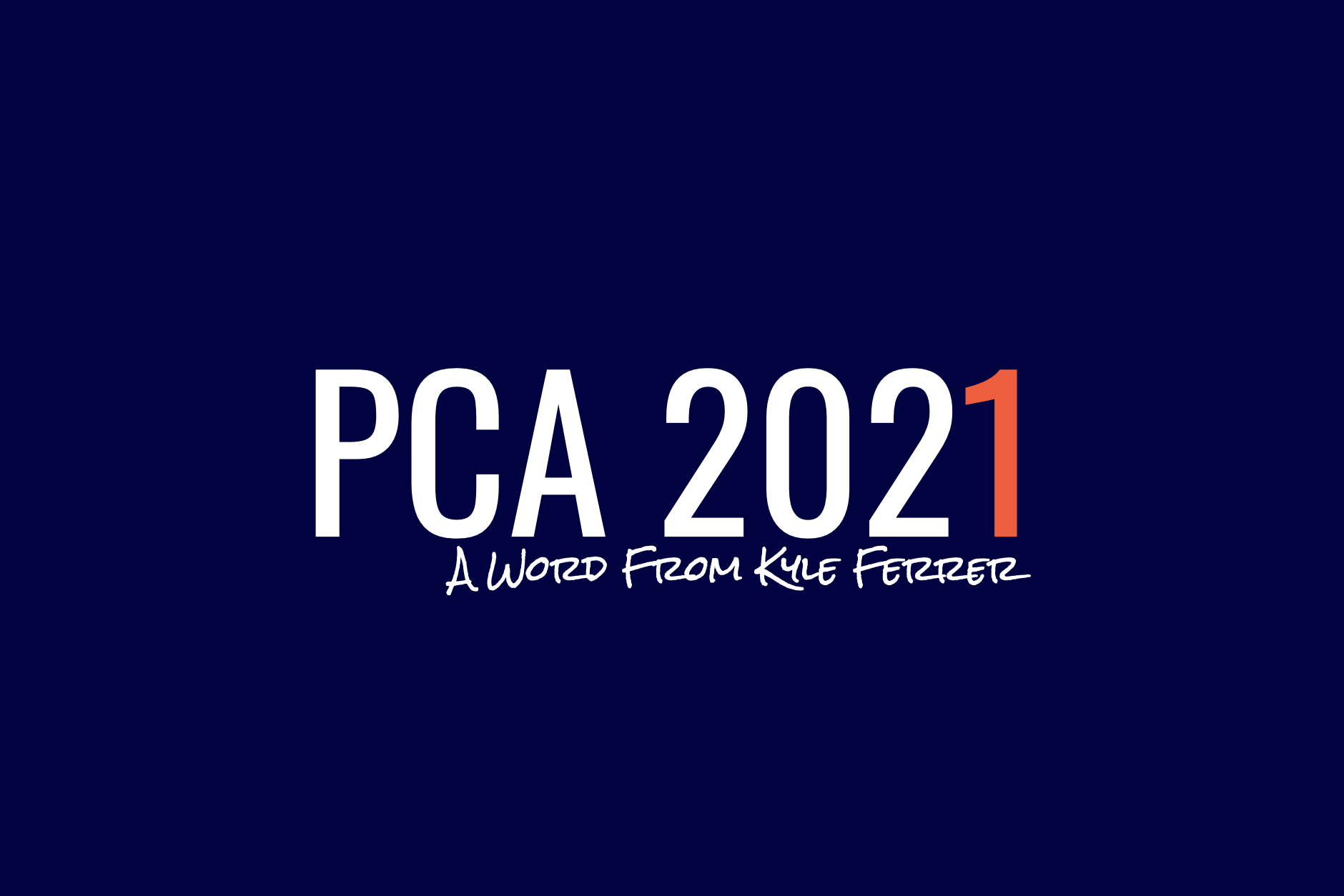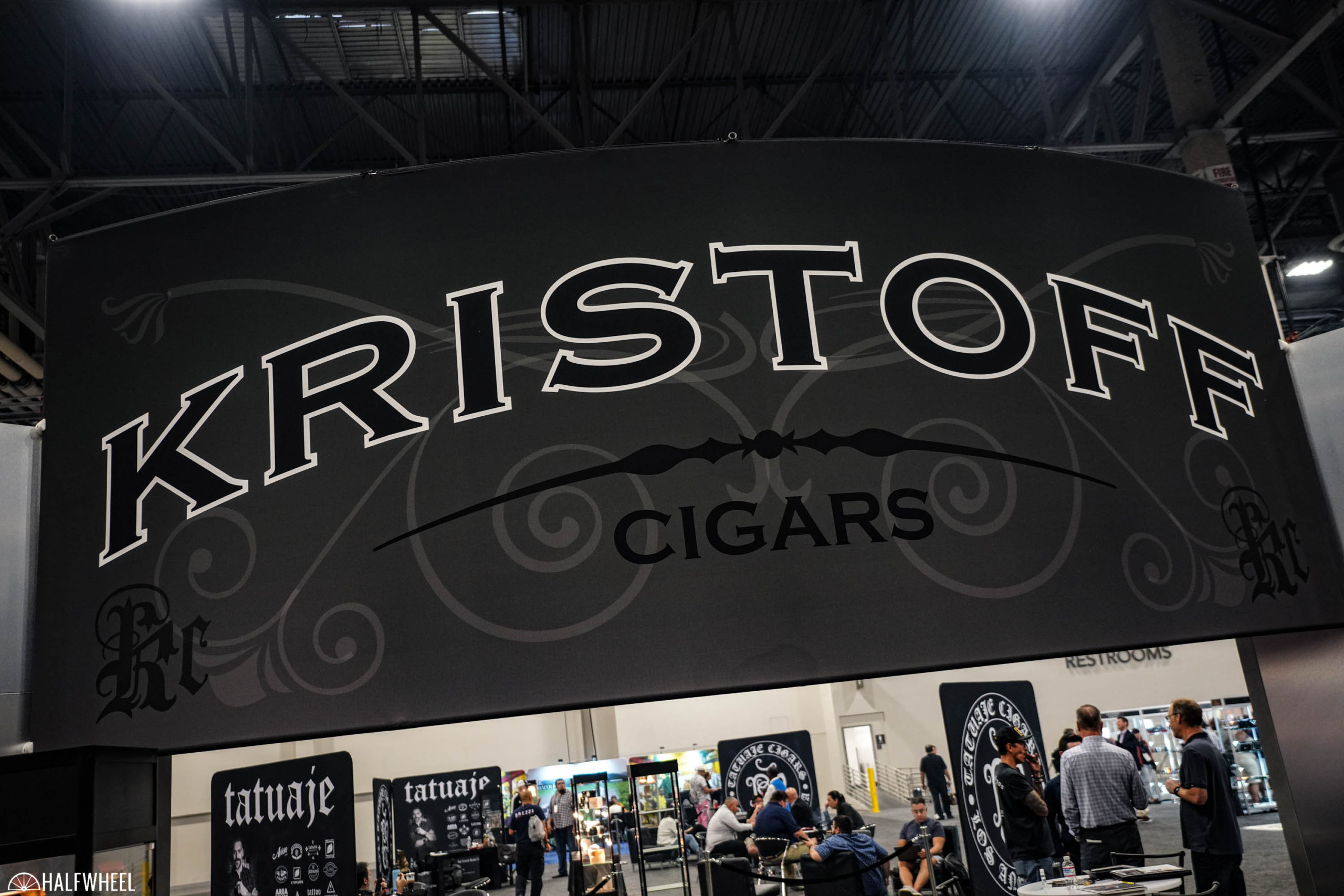I once went, for one week, to a tennis academy for players progressing toward the pro tour. The days started at 7:30 a.m. and went until 5:00 p.m. with only an hour lunch break in between the seemingly endless permutations of drills, match play, and fitness. Lulls were circumspect, and tennis was treated with martial intensity.
I had never experienced that kind of specialized exhaustion, as I was not a player progressing toward the tour. I didn’t even know exhaustion could arrive that many ways.
Perhaps that means I’ve never had a proper goal, never a higher power to please and so succumb to fevers of productivity. Whatever it means, I experienced a similar feeling of bone-weary accomplishment at the 2021 PCA Convention and Trade Show in Las Vegas, as the Editorial Assistant for halfwheel. The only difference – and it’s a big one —was that the culture, the company and the tobacco was marvelous; I had the time of my life.
Editor’s Note: Kyle served as our editorial assistant for the 2021 PCA Convention & Trade Show. His work included proofreading posts, finalizing the post layouts, uploading videos, basic office tasks and more. He spent the week with us in Las Vegas and like I’ve done before, I’ve asked him to write something about his experience. — CM.
My technical work, after internalizing its processes, became the backdrop to an education—about the cigar industry, the people under its employ, Las Vegas, halfwheel, and, of course, cigars themselves.
The halfwheel bunker morphed into a different kind of academy than the one that quashed my tennis career. Whereas I quit serious competition not long after that ruthless pounding, the rigor imposed at halfwheel made visible a world of enlarging interest and excitement. It seemed to me justifiably intense, rather than pointlessly difficult. A cigar whose smoking evolution is designed to mimic the stages of Van Halen’s “Eruption,” a new line of cigars named after Michelangelo, Raphael, and Da Vinci, a lighter whose brass ding expresses the closest thing to material epiphany – these and more made up the vast array of creative offerings. There was plenty to sop up for the inquisitive mind, and so made all the effort and energy worth giving. Cigars are a discipline, I realized, just like most other forms of art, and halfwheel practices the kind of honest criticism I’ve admired in places like The New Yorker since I was fifteen.
But let us start near the beginning. The desert burn breathed on me for the first time at McCarran Airport, felt like a celestial heating system. Its croaked dryness, in a different season, would soothe the harshest winter, but in July one simply wants to chide the staff. The climate knocks the wind out of you, and one lashes at it as if it were human mishap. Looking for a culprit, trying to attribute it to some worldly force, all I felt was the need to gently tell someone to TURN IT DOWN.
The firm and constant pressure of the heat becomes stultifying. I refer readers to John Steinbeck’s comment that he “prefers weather over climate,” because of the lotus-eating effect of stoic temperatures. It makes sense, though, that Vegas practices meteorological stasis over change. That’s their entire business model: no windows through which to yearn, few clocks by which to schedule, and no weather to explain our moods—yet always the artificial dawn of slots and tables, whirs and whoops to keep us moving. Placing Vegas in the unchanging heat was a stroke of genius, or evil, or irony, and the longer one stays in Vegas one realizes there is nothing unintentional about the place.
My preconceived notions of a convention and trade show were modest compared to the PCA reality. For booths I pictured small isles with a representative or two handing out pamphlets and a few free cigars; instead, I witnessed a maze of aesthetic pop-ups, including a museum explaining company history, a bonafide nightclub, and a lovely library with cigars placed inside the pages. The halfwheel team visited all these different booths and many more. After seeing some of them through my own preliminary stroll, every station had a second life on my computer as I edited videos, inserted pictures and heard different personalities speak into the mic. Above it all was an empyrean of puffs. Smoke, besides halfwheel and a few others, lingered, it seemed, to jot down the news.
The halfwheel booth was more like a makeshift cloister, eking out pellets of live coverage as each day wore on. It was a nondescript content factory, and I, for my part, fell in love with a laptop: editing, proofreading, and finally scheduling posts for the website. The four writers came and went, in varying moods of subdued achievement, regaling me with stories of friendly success, recalcitrant booths, aimless footage, and sometimes just simple silence.
Everyone returned from the show floor in this nearly uniform way: an initial flush of weariness, like a traveler come in from the cold, a glance toward me, the groundskeeper, a comment (maybe), and then a slow migration to their desk, hardening into a rhythm of procedure and focus.
What struck me most was that this was a cadre of individuals devoted to their work. Despite the occasional grousings or enticing moments of gossip, I was working with people who had clear vitality.
They had opinions, attitudes, and experiences that weren’t the deodorized tales of most of the people one greets. The idea often heard from chefs and comics—that they had little concept of the profession but an ardent interest in its individuals—finally made sense to me. I knew nothing about cigars, but the halfwheel team stung me with their sharp minds, their evident and never repetitive intelligence, their wit, and their erudition. It was intoxicating in a way I can only imagine must be similar to what Bourdain or Leno speak of. As a kid trying to find a way to prosper without sacrificing most myself in the process, Charlie Minato, Brooks Whittington, Patrick Lagreid and Brian Burt were fresh models of excellence.
In a way, Vegas entered my system and did a flip. It had an effect the town would despise—that though for a period of days I did not see or recognize the outside world, it was the work, not the wildness, that stuck. I could care less about the nation of hedonism or the gambler’s oasis. I left Las Vegas wanting to realize a clearer ambition.
Casinos are great until their glamor rots; dinners are amazing until they topple, like a too-tall cake, under the weight of extravagance. Lavishness becomes tiresome.
I don’t mean to complain.
Every culinary experience the halfwheel team brought me (and, generously, my girlfriend) along to was uniquely pleasing and tasty. But those things are fleeting. “Life is an affair of people not of places,” Wallace Stevens says, and it’s the people that will remain in my mind. Brooks’ insistence on the Footloose soundtrack as the acme of 80s music, as well as his unflagging attention to my cigar collection; Patrick’s surprised query on Friday lunch: “beverages?” (and, of course, the bumper ads narrated by Patrick’s metallurgical gift of a voice); Brian’s patience in answering all my rookie cigar questions; Charlie’s bright censure to help straighten all my mistakes—these are the things one does not forget. It was the incalculable simpatico, the passion, in all its moody guises, that made the halfwheel team a pleasure to just be around. I know I’m only 23, but it seems like that might be a rare thing.
Until next time,
Kyle



